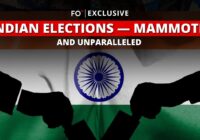With a new government in India, will Pakistan be able to contain its jihadists?
More evidence is emerging that Pakistan’s security establishment is not an omnipotent presence, but rather the victim of what might be called the “Sorcerer’s Apprentice Syndrome” from Goethe’s classic tale about the dangers of conjuring up proxies one cannot ultimately control. That some of the jihadist forces Pakistan has long directed to do mayhem against others have now turned against it is a predicament, which has important ramifications for the approach India’s new government adopts toward its most vexatious neighbor.
A Delayed Campaign
Pakistan has now launched a major military assault designed to clear antigovernment militants from North Waziristan, a notoriously lawless zone along the border with Afghanistan, which has long been infested with all sorts of jihadist groups. The operation, which a senior Pakistani official calls “bigger than the war of 1971,” has been a long time in coming. There were news reports three years ago that Pakistan was about to commence an offensive, and two years ago, then-US Defense Secretary Leon Panetta made a similar announcement.
In both cases, the Pakistani army ultimately failed to act, ostensibly on the grounds that it was already stretched too thin to carry out such a massive operation; though foreign observers suspected at the time that Islamabad really had no interest in moving against its jihadist allies ensconced in North Waziristan. As one US official noted sarcastically a while back: “This is the most delayed campaign in the history of modern warfare.”
A recent media interview by retired Gen. Athar Abbas, who headed the military’s press relations agency in 2008-12, has now thrown additional light on Pakistani decision making back then. He reveals that a key factor over why Ashfaq Parvez Kayani, the army chief at the time, put an end to plans for a North Waziristan offensive was because he feared, as Abbas puts it, that “militant groups or tribes on our side would turn against us.” According to Abbas, Gen. Kayani was also afraid for his own personal safety, believing that Islamist groups might try to dispatch him just as his predecessor, Gen. Pervez Musharraf, was the target of numerous assassination plots.
In late 2013, Islamabad went on a heightened security alert amid intelligence reports of planned militant attacks against the headquarters of the Pakistani air force and navy.
Other Pakistani officials have expressed similar apprehensions. Lieutenant Gen. Ahmad Shuja Pasha, who formerly directed the Inter-Services Intelligence (ISI) agency, acknowledged before the official Pakistani inquiry into the Abbottabad affair that, even though the government was aware of “foreign miscreants” sheltering in urban areas, the lawless conditions prevailing in the country’s major cities deter authorities from making arrests. The inquiry’s report quotes Pasha as testifying that: “We are a failing state even if we are not yet a failed state.”
A Failing State?
Militants have mounted significant attacks against the Pakistani military establishment in recent years, including on the army’s main headquarters in Rawalpindi in October 2009; ISI offices in Lahore in May 2009, Peshawar in November 2009, and Sukkur in July 2013; the navy base in Karachi in May 2011; and an air base near Islamabad in August 2012.
In late 2013, Islamabad went on a heightened security alert amid intelligence reports of planned militant attacks against the headquarters of the Pakistani air force and navy. Fearing blowback from the now-commenced North Waziristan operation, the national government in Islamabad has taken the extraordinary step of putting the army in charge of the city’s security for the next three months.
A number of general officers have been assassinated, including a major general in September 2013. The army has reportedly lost nearly twice as many soldiers fighting the Pakistani variant of the Taliban as the US has in Afghanistan. Cynics might attach a huge measure of poetic justice to these travails, but they do highlight the tenuous control the Pakistani state exercises over matters within its own borders.
Indians take justifiable umbrage that Hafiz Muhammed Saeed, the orchestrator of the horrific 2008 terrorist attacks in Mumbai and the founder of Lashkar-e-Taiba (LeT), South Asia’s preeminent terrorist group, freely parades around the streets of Lahore. He is certainly a man who for too long has been allowed to escape the dispensation of justice. But his continued liberty may be less a function of official complicity than outright fear of LeT’s large and well-organized numbers. One security official has admitted that if LeT ever turned against Islamabad, it could send the country “up in flames.” This prospect is especially ominous given LeT’s deep roots in Pakistan’s Punjabi heartland.
All of this has significant implications for how India deals with Pakistan. Narendra Modi’s political faction, the Bharatiya Janata Party, has long held hawkish views toward Islamabad. During the recent electoral campaign, the Indian prime minister called for a “zero-tolerance policy” against Pakistan-sourced terrorist attacks.
Other jihadist groups have already set the country’s urban areas aflame, challenging the authority of the state and setting off an explosion of sectarian bloodletting. According to Maplecroft, a British risk consultancy, Pakistan suffered the second-highest number of terrorist incidents in the world in 2013 after Iraq. Large parts of Karachi, the country’s principal city and economic hub, are now under the control of the antigovernment Pakistani Taliban. A year ago, the Taliban in Karachi assassinated the security chief for then-President Asif Ali Zardari. Earlier this year, it killed a senior police commander there, and two months ago, it mounted a brazen attack on the city’s international airport. According to The Express Tribune, 100 police officials have been killed in Karachi this year so far, compared to the 166 murdered in all of 2013.
International Implications
Another sign that capable militant elements now operate beyond the writ of the Pakistani state is the warning then-US Defense Secretary Robert Gates issued a few years ago about the danger of freebooting jihadists conducting operations aimed at catalyzing unwanted war between India and Pakistan. A prime example of this peril is the egregious assault upon the Indian parliament by Pakistan-based militant groups in December 2001, which in turn caused a prolonged military crisis between the two countries. According to Bruce Riedel, a well-informed expert, the attack, which occurred right as the Taliban regime was collapsing, may have been a jihadist effort to divert the Pakistani military attention away from the Afghan border, precisely when Osama bin Laden and hundreds of al-Qaeda and Taliban fighters fled Afghanistan.
Similarly, the Mumbai attacks in 2008 may well have been a jihadist effort to sabotage the intensive backchannel peace talks that took place in 2004-07 between Islamabad and New Delhi, which were reportedly on the verge of defusing the perennially-inflamed Kashmir issue.
All of this has significant implications for how India deals with Pakistan. Narendra Modi’s political faction, the Bharatiya Janata Party, has long held hawkish views toward Islamabad. During the recent electoral campaign, the Indian prime minister called for a “zero-tolerance policy” against Pakistan-sourced terrorist attacks. His appointment of Ajit Doval — who had a legendary career in India’s domestic intelligence service — as national security advisor is taken by many to be a sign that Modi intends to translate this rhetoric into actual practice.
Commenting several years ago on “Pakistan’s unabated covert offensive against India,” Doval argued: “For almost three decades, India has passively accepted such provocations. It has failed to retaliate in a proactive manner that could raise costs for Pakistan and compel it to roll back its anti-India terrorist infrastructure.” That there is an even more serious militant offensive occurring within Pakistan’s borders did not merit mention in Doval’s analysis.
Those in India demanding a hard-line stance toward Pakistan tend to speak of the country as if it were an ordinary state with a single, unified government that is not confronted by significant anti-state violence. Or if they acknowledge the dichotomy between the often hapless civilian leadership and the much more effective military establishment, they nonetheless assert that the military must have substantial sway over the myriad of jihadist elements operating in the country. But events now playing out in Pakistan once again call this assumption into question, and challenge the easy talk in New Delhi about the virtues of a new get-tough policy.
The views expressed in this article are the author’s own and do not necessarily reflect Fair Observer’s editorial policy.
Support Fair Observer
We rely on your support for our independence, diversity and quality.
For more than 10 years, Fair Observer has been free, fair and independent. No billionaire owns us, no advertisers control us. We are a reader-supported nonprofit. Unlike many other publications, we keep our content free for readers regardless of where they live or whether they can afford to pay. We have no paywalls and no ads.
In the post-truth era of fake news, echo chambers and filter bubbles, we publish a plurality of perspectives from around the world. Anyone can publish with us, but everyone goes through a rigorous editorial process. So, you get fact-checked, well-reasoned content instead of noise.
We publish 2,500+ voices from 90+ countries. We also conduct education and training programs
on subjects ranging from digital media and journalism to writing and critical thinking. This
doesn’t come cheap. Servers, editors, trainers and web developers cost
money.
Please consider supporting us on a regular basis as a recurring donor or a
sustaining member.
Will you support FO’s journalism?
We rely on your support for our independence, diversity and quality.







Comment